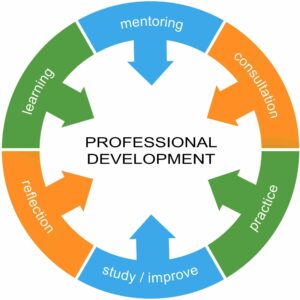Professional Development

|
Massachusetts Standards for Professional Development
Massachusetts defines High Quality Professional Development (HQPD) as: A set of coherent learning experiences that is systematic, purposeful, and structured over a sustained period of time with the goal of improving teacher practice and student outcomes. It enables educators to facilitate the learning of students by acquiring and applying knowledge, skills, and abilities that address student needs and improvement goals of the district, school, and individual. HQPD conforms to best practices in research, relates to educators’ assignments and professional responsibilities, and conforms to the ten Massachusetts Standards for Professional Development.1
The ten standards that make up the Massachusetts Standards for Professional Development:
- HQPD has clear goals and objectives relevant to desired student outcomes.
- HQPD aligns with state, district, school, and/or educator goals or priorities.
- HQPD is designed based on the analysis of data relevant to the identified goals, objectives, and audience.
- HQPD is assessed to ensure that it is meeting the targeted goals and objectives.
- HQPD promotes collaboration among educators to encourage sharing of ideas and working together to achieve the identified goals and objectives.
- HQPD advances an educator’s ability to apply learnings from the professional development to his/her particular content and/or context.
- HQPD models good pedagogical practice and applies knowledge of adult learning theory to engage educators.
- HQPD makes use of relevant resources to ensure that the identified goals and objectives are met.
- HQPD is taught or facilitated by a professional who is knowledgeable about the identified objectives.
- HQPD sessions connect and build upon each other to provide a coherent and useful learning experience for educators.
Activities not considered Professional Development:
The following are definitions of activities not considered professional development.
- Training: Informational sessions focused on learning discrete skills and/or performing individual tasks. An example of training is a session on how to access a report in a database. Training is brief and has a beginning and an end.
- Technical Assistance (TA): The provision of brief, targeted support with the goal of aiding the recipient in knowledge application. Technical assistance provides advice and guidance in the use of resources, materials and equipment.
- Meetings: Faculty meetings, department meetings, planning meetings or other meetings are typically not considered professional development. However, if there are a series of meetings with specific targeted learning objective(s) relevant to desired student outcomes, with a designated (in-district or out-of-district) facilitator/coach who is knowledgeable about the identified objectives which directly tie into the School and/or District Improvement Plan the time may qualify as HQPD.